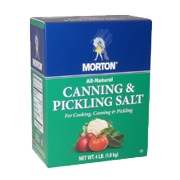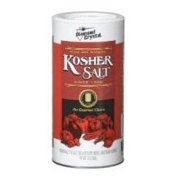Salts (table or cooking) with the fewest additives
- A short answer
- The details: extra substances in salt products
A short answer: try canning/pickling salt
I'll go into more detail about extra substances in salt products below, but I personally take the simple route of just buying canning salt, avoiding anticaking agents and not worrying about using salt to get iodine or minerals (as in sea salt). I buy:

Online ordering
Walmart has the cheapest online-ordering price I've found, $21.59 with free shipping on an order exceeding $35.
Amazon is more expensive currently, but worth checking on because the prices fluctuate a lot.
Morton's is available on amazon.co.uk, but it's currently overpriced.
Finding locally
I've had about a 50% success rate finding this (or any other brand of canning/pickling salt) in my local grocery stores. Morton has a store locator that can help.
Salt.
Many kosher salts brands are equivalent to canning/pickling salt, containing no extra substances. One example, more widely available in the UK than Morton's:

Online ordering
Available from Amazon.
Available from Amazon.co.uk, Sous Chef, and Buy from Melbury & Appleton.
Salt.
In humid areas, salts like these may clump together because they don't have any anticaking agents. Adding a few grains of uncooked rice to a salt shaker can help prevent this by absorbing moisture.
The details: extra substances in salt products
Anticaking/anticlumping agents
The most common anticaking agents added to salts are calcium silicate (also known as E552), sodium ferrocyanide (aka yellow prussiate of soda, YPS, or E535), tricalcium phosphate (aka TCP or E342), and sodium silicoaluminate (aka sodium aluminosilicate or E554). Magnesium carbonate was also used as an early anti-caking agent, but I haven't found any brands that still use it.
I don't have any reason to believe those anticaking agents are harmful, but they're easy enough to avoid with canning salt.
Iodine
Most table salts are iodized/iodised to help fight iodine deficiency (see this map for an estimate of the degree of iodine deficiency in your country). However, an analysis of iodized salt products found a lot of variation in their iodine levels, so they might not be a good choice for those who want to carefully control their iodine levels.
Dextrose may also be added to iodized salt to stabilize the iodine.
I've never been able to find a non-sea-salt iodized salt without anticaking agents. If you know of one, please let me know in the comments section.
Fluoride
Some countries fluoridate their salt with potassium fluoride, sodium fluoride, sodium fluosilicate, or other fluoride sources to reduce the risk of dental cavities. I haven't found a master list of such countries anywhere (if you know of one, please let me know in the comments), but France, Germany, Switzerland, Austria, Czech Republic, and Spain are some of the estimated 15 countries with salt fluoridation programs. Some sites claim that fluoridation ingredients are not required to be included in the salt's ingredients list, so it might be worth contacting the manufacturer if you live in a fluoridating country.
Sea salt can also have significant flouride content depending on the source.
Microplastics
A recent study looked at 38 salt products (28 sea salts, 9 rock salts, and 2 lake salts). They found only 3 to be free of microplastics (a refined sea salt from Taiwan, a refined rock salt from China, and an evaporation-process sea salt from France). Sea salts were the most contaminated on average (675 n/kg compared to 38 for rock salts and 245 for lake salts).
It's hard to draw conclusions from the study, and I don't know much about the effect of microplastics on humans, but it nudges me further towards preferring refined salt. It also implies that salts from Asian waters may be more polluted.
Minerals and metals in sea salts
Sea salt is often promoted as completely superior to ordinary refined salt because of its mineral content. However, it can also carry contain tiny amounts of harmful substances like aluminum, lead, and mercury. I don't mean this as a scare tactic: most foods will have some of these substances, and it's possible that ordinary refined salt retains some the harmful refining agents used in its processing. However, such substances make sea salt less of a no-brainer for people like me who are confident they're getting adequate minerals elsewhere, don't care about the taste of sea salt, and would prefer lower-cost salt.
Here are some chemical analyses if you'd like to find a sea salt with the highest levels of the minerals you're looking for, with the minimum of harmful substances. If you know of any analyses of ordinary refined salt, please let me know in the comments.
- General comparisons
- A comparison of Cyprus Black, Mediterranean Sea Salt, Sel Gris De Guerande, Alaea Hawaiian Sea Salt, Hawaii Kai Black Salt, Murray River Pink Flake Salt, Primordial Himalayan Salt, Sel de Mer, Kala Namak Black Mineral Salt, Fumee de Sel Chardonnay Oak Smoked Salt, and Himalayan Pink Fine Mineral Salt.
- Utah sea salt
- Real Salt brand analysis directly from the company (if their comparison is to be believed, their preserved-ancient-ocean Utah salt is less likely to be tainted with pollution than "live ocean" salt like Celtic sea salt, and their Utah processing is more likely to safely handle the salt than remote Himalayan mines). It shows 97.97% sodium + chloride.
- Himalayan (Pakistan) sea salt
- Himalayan pink rock salt analysis from a salt blog, originally from the book Water & Salt: The Essence of Life. It shows 87.35% sodium + chloride.
- Himalayan pink rock salt analysis from a food-supply store. It shows 97.35% sodium + chloride.
- Celtic sea salt
- A general look at pollution in Celtic Sea Salt.
- Celtic sea salt analysis from a New Age-ish site selling the salt. It shows 86.64% sodium + chloride.
- Selina Naturally brand Celtic sea salt analysis directly from the company (I think their page discussing the analysis is misleading because it combines mineral and moisture content, making the mineral content seem higher than it really is). It shows sodium + chloride ranging from 83.90% to 94.90% depending on the type.
- Hawaiian sea salt
- Analysis of five types of Hawaiian sea salts directly from the company. It shows sodium + chloride ranging from 94.79% to 95.96% depending on the type.
- Fleur de sel sea salt
- Minimal analysis of Portuguese Flos Salis brand Fleur de sel directly from the company. It shows 94.3% to 97.6% sodium chloride.
- Minimal analysis of SaltWorks brand Le Tresor Fleur de sel directly from the company. It shows 92.02% sodium + chloride.
- French grey salt (from Guerande)
- Minimal analysis of Brittany Sea Salt directly from the company.
- Brazilian coast salt
- Analysis of SaltWorks Pure Ocean Atlantic Sea Salt directly from the company.
Based on those analyses, Real Salt brand seems like a good (and fairly affordable) option for sea salt, and it's commonly available in health food stores or online in bulk.
Ingredient details for common salt brands
- contains anti-caking agents
- contains iodine
Sodium chloride, zinc oxide, manganese sulphate, potassium chloride, potassium iodide, chromium picolinate, tricalcium phosphate, ferrous fumarate, trace minerals, magnesium oxide, copper gluconate from sea salt
- contains anti-caking agents
- contains iodine
Salt, silicon dioxide, tricalcium phosphate, sodium bicarbonate, dextrose, potassium iodide.
- free of anti-caking agents
- does not contain iodine
Salt.
- contains anti-caking agents
- contains iodine
Salt, silicon dioxide, tricalcium phosphate, dextrose, sodium bicarbonate and potassium iodide.
- contains anti-caking agents
- contains iodine
Salt, calcium silicate, dextrose, potassium iodide, sodium bicarbonate.
- contains anti-caking agents
- does not contain iodine
Salt, calcium silicate.
- free of anti-caking agents
- does not contain iodine
Salt.
- contains anti-caking agents
- does not contain iodine
Salt, yellow prussiate of soda.
- contains anti-caking agents
- does not contain iodine
Sea salt, yellow prussiate of soda.
- contains anti-caking agents
- contains iodine
Salt, calcium silicate, sugar, potassium iodide.
- contains anti-caking agents
- contains iodine
Sea salt, calcium silicate, dextrose, potassium iodide.
- free of anti-caking agents
- does not contain iodine
Sea salt.
- contains anti-caking agents
- does not contain iodine
Salt, calcium silicate.
- contains anti-caking agents
- contains iodine
Salt, sodium silicoaluminate, sodium thiosulfate, potassium iodide.
You made it to the end of this long, boring page about salt without falling asleep! I salute you.